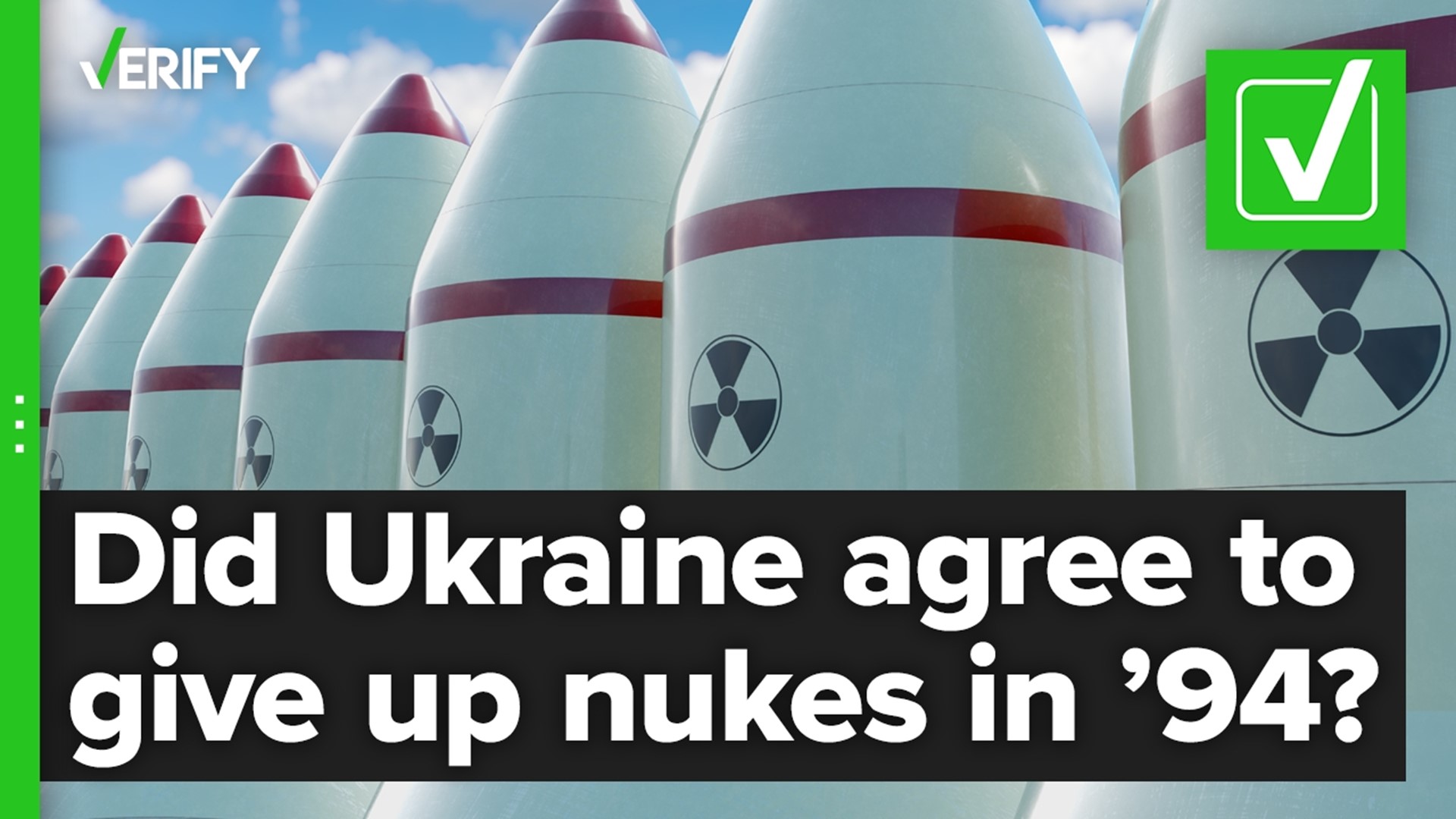International leaders called Russia’s invasion of Ukraine illegal immediately after it began, citing a number of international laws and treaties. One of those treaties is the Budapest Memorandum, an agreement made between Ukraine, Russia, the United States and the United Kingdom in 1994.
Viewer Joe O. texted VERIFY to ask about the Budapest Memorandum: “Can you verify if [former President] Bill Clinton made a treaty with Ukraine and Russia that said if Ukraine would give up its nukes, America and Russia would guarantee their safety and never attack them?”
THE QUESTION
Did Ukraine agree to give up its nuclear weapons in 1994 in exchange for safety from a U.S. or Russian invasion?
THE SOURCES
- Text of 1994 Budapest Memorandum
- Arms Control Association
- The Wilson Center, a non-partisan policy forum on global issues
- U.S. State Department
THE ANSWER
Yes, Ukraine agreed to give up its nuclear weapons in 1994 in exchange for safety from a U.S. or Russian invasion.
WHAT WE FOUND
In 1994, Ukraine, Russia, the U.S. and the U.K. signed the Budapest Memorandum. The other three nations made six commitments to Ukraine: to respect Ukraine’s independence and existing borders, to refrain from the threat or use of force against Ukraine except for in defense, to refrain from economic coercion to gain advantages from Ukraine, to provide assistance to Ukraine if it becomes victim to an act of aggression in which nuclear weapons are used, to not use their nuclear weapons on Ukraine or other non-nuclear-weapon states and to consult one another in the event these commitments are put into question.
Ukraine, in return, committed to eliminating “all nuclear weapons from its territory within a specified period of time.”
When the Soviet Union dissolved in 1991, the country’s nuclear arsenal was split between four different countries: Ukraine, Russia, Belarus and Kazakhstan. Much of that arsenal ended up in Ukraine, which inherited the third largest nuclear arsenal in the world, the Arms Control Association says.
The Wilson Center, a non-partisan policy forum on global issues, said in an issue brief that Ukraine was reluctant to give up its nuclear weapons without security guarantees. By 1992, the Russian parliament had already passed a resolution that said Crimea — the peninsula later annexed by Russia in 2014 — should never have been given to Ukraine. Ukraine’s own parliament therefore demanded that security guarantees be provided in a legally binding treaty, the Wilson Center said.
In the final version of the deal, Russia promised not to attack Ukraine. While the U.S. and the U.K. assured Ukraine they would aid if it was attacked by Russia, that promised aid did not guarantee military support like a NATO country would receive.
In 2009, Russia and the U.S. announced that the assurances in the Budapest Memorandum would continue to remain in effect in the future.
But Russia first violated the memorandum in 2014, when it sent its military into Crimea and annexed it. The other three nations named in the Budapest Memorandum invoked the treaty’s sixth assurance, or the agreement to consult each other in the event the treaty’s commitments came into question, and met in Paris to discuss the invasion. Russia did not attend the meeting.
The Arms Control Association said a Russian foreign ministry official argued for Russia’s right to disregard the Budapest Memorandum by claiming “the security assurances were given to the legitimate government of Ukraine but not to the forces that came to power following the coup d’etat.” In the months prior to Russia’s invasion of Crimea, Ukrainian citizens ousted the country’s authoritarian president through protests.
In 2016, Russian foreign minister Sergey Lavrov claimed in a press conference the treaty contained only one obligation: Not to use nuclear weapons on Ukraine. But the text of the agreement shows that claim was false.
More from VERIFY: No, the UN doesn’t have the authority to charge people with war crimes

